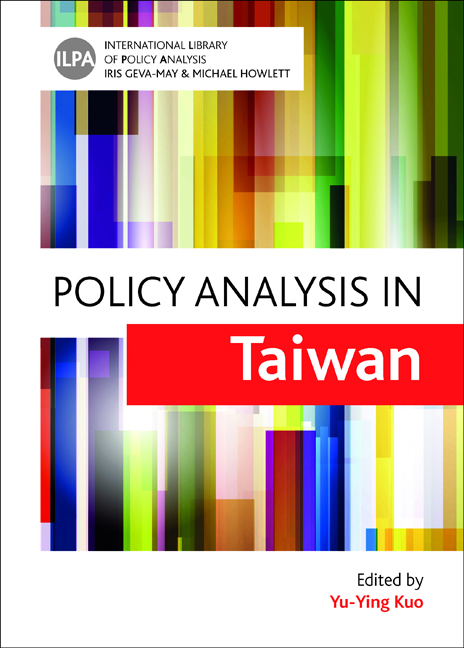Book contents
- Frontmatter
- Contents
- List of tables and figures
- Acknowledgements
- Notes on contributors
- One Policy analysis in a time of turbulence
- Two Exploring policy advisory committees in the central government
- Three Analysis of innovative local government policies in Taiwan
- Four Policy analysis in the legislative body: the legislative process of the Soil and Groundwater Pollution Remediation Act in Taiwan
- Five Policy analysis in the local councils
- Six Gendering policy analysis? The problems and pitfalls of participatory ‘gender impact assessment’
- Seven The power of influencing policies, or getting their share and more: interest groups in Taiwan
- Eight Think tanks in Taiwan
- Nine The development of public engagement in Taiwan
- Ten Social media and policy evolution in Taiwan
- Eleven Policy analysis by non-governmental organisations in Taiwan
- Twelve Policy network of universal healthcare reform in Taiwan
- Thirteen Public policy and administration research
- Fourteen Too critical to ignore? A tri-dimensional relationship examination of policy analysis internship in Taiwan
- Fifteen Policy analysis in Taiwan in an international perspective
- Sixteen Policy analysis education in Taiwan: a comparative perspective
- Index
Twelve - Policy network of universal healthcare reform in Taiwan
Published online by Cambridge University Press: 11 March 2022
- Frontmatter
- Contents
- List of tables and figures
- Acknowledgements
- Notes on contributors
- One Policy analysis in a time of turbulence
- Two Exploring policy advisory committees in the central government
- Three Analysis of innovative local government policies in Taiwan
- Four Policy analysis in the legislative body: the legislative process of the Soil and Groundwater Pollution Remediation Act in Taiwan
- Five Policy analysis in the local councils
- Six Gendering policy analysis? The problems and pitfalls of participatory ‘gender impact assessment’
- Seven The power of influencing policies, or getting their share and more: interest groups in Taiwan
- Eight Think tanks in Taiwan
- Nine The development of public engagement in Taiwan
- Ten Social media and policy evolution in Taiwan
- Eleven Policy analysis by non-governmental organisations in Taiwan
- Twelve Policy network of universal healthcare reform in Taiwan
- Thirteen Public policy and administration research
- Fourteen Too critical to ignore? A tri-dimensional relationship examination of policy analysis internship in Taiwan
- Fifteen Policy analysis in Taiwan in an international perspective
- Sixteen Policy analysis education in Taiwan: a comparative perspective
- Index
Summary
Introduction
The structure of governance and management of networks have received increasing attention in recent years with the spread of policy networks aimed at describing policy processes in modern society. It has been argued that it is necessary to understand the internal functioning of networks in order to evaluate how different ties between policy stakeholders produce policy outcomes. Social network analysis (SNA), as a research tool of policy networks, can systematically characterise the power and positions of key players, describing the role stakeholders play in influencing various policy decisions. In addition, SNA adds value by enumerating the linkages between those actors, particularly in terms of how information and political resource are exchanged and who is included or excluded from the process. Moreover, drawing on graph theory and classical sociology (Luke and Harris, 2007), SNA has been widely applied in various public policy disciplines. More and more cases show that if SNA is applied to studying policy networks it can help the understanding of the nature of power pathways and influence in policy processes.
This chapter attempts to shed light on this research area by means of a study of Taiwan's National Health Insurance (NHI) reform between 2004 and 2012. The Taiwan government announced the termination of martial law in 1986, following which Taiwan quickly transformed into a full-fledged democracy (Aspalter, 2002: 4). Thus, the ruling party, Kuomintang, faced a challenge from the opposition party and civil society associations in the late 1980s. In order to cope with these challenges, Kuomintang shifted its attention to the construction of a universal welfare system by integrating the original four insurance systems and expanding coverage from 59% to universal (BNHI, 2007). After more than two decades of democratisation, Taiwan established a universal healthcare system responsible for the welfare of all inhabitants, which has become an important determinant of governmental legitimacy in Taiwan. As some significant research works indicate, healthcare is a social welfare policy, but one that is highly influenced by politics (Weissert and Weissert, 1996; Moran, 1999; Thomas and Gilson, 2004). In Taiwan as well, healthcare is a political issue (Wong, 2003, 2004; Lin et al, 2010; Wang, 2012).
The NHI was designed to include characteristics such as compulsory enrolment, a single public player (Bureau of National Health Insurance, BNHI), and contributions shared by employer, employee and the government.
- Type
- Chapter
- Information
- Policy Analysis in Taiwan , pp. 171 - 186Publisher: Bristol University PressPrint publication year: 2015



